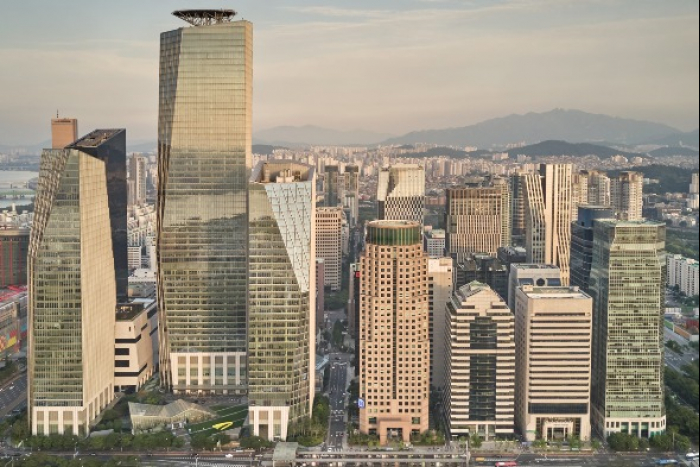Korean stock market
Smaller firms' successful IPOs fail to boost Korean listing market
Investor demand for smaller caps much higher than last year; large deals not yet garnering the same attention
By Feb 22, 2023 (Gmt+09:00)
2
Min read
Most Read
S.Korea's LS Materials set to boost earnings ahead of IPO process


NPS to commit $1.1 billion to external managers in 2024


Samsung Heavy Industries succeeds autonomous vessel navigation


Samsung shifts to emergency mode with 6-day work week for executives


Korean battery maker SK On expects business turnaround in H2



South Korean companies are returning to the local initial public offering market this year, after failing their market debuts last year. But that hasn't led to a boom in the IPO market as a whole as large deals, targeting more than 1 trillion won ($766.5 million) in valuation, are not attracting investors.┬Ā ┬Ā ┬Ā ┬Ā ┬Ā ┬Ā┬Ā
Zaram Technology Inc., a chip designer and manufacturer, is offering IPO subscriptions for retail investors Feb. 22-23. The company, which postponed its listing plan in October and December of last year due to chilly market sentiment, saw its bookbuilding for institutional investors oversubscribed 1,702 times last week.
Backed by the soaring demand, its offering price per share was set at 22,000 won, exceeding the indicative range between 16,000 won and 20,000 won. ZaramŌĆÖs market capitalization reached 136.4 billion won ŌĆō higher than the lower end of the valuation range proposed last year, heating up the IPO market for small- and mid-cap stocks.
Battery material supplier Jeio and contract research company Bioinfra also saw high demand from investors earlier this month, after postponing their listing plans last year. Their bookbuilding processes for institutional investors were oversubscribed 353 and 1,595 times, respectively.
Bioinfra, which has secured a deposit of 1.8 trillion won from investorsŌĆÖ subscriptions, is set to trade its shares from March 2.┬Ā
Jeio, which was listed on the Kosdaq on Feb. 16, saw its market cap surge to 680 billion won after going public. The battery material company, which offered its market value in the range of 499.9 billion-599.9 billion won last year, cut its IPO size by 30% to 407.7 billion won this year for an easier market debut.
The small- and mid-cap shares are rebooting the Kosdaq, raising investorsŌĆÖ expectations of ŌĆ£ddasangŌĆØ, market slang that refers to a new stock opening at double the offering price and hitting the daily limit on the first trading day.┬Ā
The Kosdaq IPOs that have posted such records so far this year include chip trading company Mirai Semiconductors Co., software developer Obzen, electric car battery maker Samkee EV Co., animation production firm Studio Mir Co., furniture maker Ggumbi, security service provider Sands Lab and stem cell developer Innogene.
In contrast, investor interest in the large IPOs remains tepid.┬Ā
Oasis Corp., a grocery delivery platform, decided to withdraw its listing plan earlier this month on weak demand from institutional investors. Most of the investors placed bids at prices below the indicative range of 30,500-39,500 won during the bookbuilding.
Other large-scale IPOs, including gourmet food delivery platform Kurly Inc., golf course operator Golfzon County Co., online banking services provider K Bank Co. and game developer Lionheart Studio Corp., dropped their listing plans last year.
"More investors are rushing to growth equity in certain sectors, such as chip and EV batteries, widening the gap between the small-to-mid-cap and large-cap IPOs," said an investment banking source.
ŌĆ£To reboot the entire public offering market, large deals need more investment like in 2021. The market is overheated with smaller caps now,ŌĆØ the source added.┬Ā┬Ā
Write to Seok-Cheol Choi at dolsoi@hankyung.com
Jihyun Kim edited this article.
More to Read
-
 IPOsS.Korean grocery delivery platform Oasis drops IPO on weak demand
IPOsS.Korean grocery delivery platform Oasis drops IPO on weak demandFeb 13, 2023 (Gmt+09:00)
1 Min read -

-
 IPOsBionote slashs IPO price to 9,000 won, 50% lower than previous valuation
IPOsBionote slashs IPO price to 9,000 won, 50% lower than previous valuationDec 13, 2022 (Gmt+09:00)
1 Min read -

-
 IPOsMiniforce producer aims to become Asia's top children's platform with IPO
IPOsMiniforce producer aims to become Asia's top children's platform with IPONov 15, 2022 (Gmt+09:00)
1 Min read
Comment 0
LOG IN


